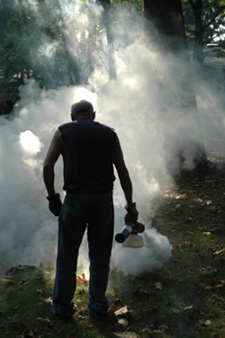Tiny Mosquito
Mosquitoes Developing Stronger Defences to Insecticide
Mosquito-borne diseases such as West Nile and Malaria are on the increase. In 2002, Toronto reported its first case of West Nile. The event was covered by TV and newspapers countrywide. Media and public interest is well justified as the consequences of this disease are significant. West Nile is not only deadly to humans, but also to pets and livestock.
The only way to eradicate mosquito-borne diseases is to control the mosquito population. Unfortunately, mosquito resistance to insecticide has become a major concern. Scientists are diligent in their study of mosquitoes, hoping to find ways to break through genetic defences and come up with an effective battle plan to fight these pests.
 The
Study of Mosquito Resistance to Insecticide
The
Study of Mosquito Resistance to Insecticide
Malaria kills over a million people each year. Most victims are
children in third world countries, Africa being one of the most affected
regions. It is a disease whose symptoms can recur for many years, debilitating
those that survive. Many governments have implemented the use of mosquito
netting and spraying programs in order to curb the propagation of this
illness. The insecticide consists of pyrethroids. Although insect repellents
were initially effectual, over the years they have gradually lost their
potency to kill mosquitoes.
Insecticide seems to have triggered an evolutionary response in mosquitoes, a natural mechanism that ensures their survival. Scientists working to understand mosquito resistance to insecticide opine that attacking the genes that help the mosquito adapt to pyrethroids is a step in the right direction. During their study of the Anopheles Funestus mosquito, one of the most prevalent carriers of malaria in Africa, researchers compared strains known to be resistant to strains that are non resistant in order to narrow down the genetic difference. Their research revealed the genes that are responsible for getting rid of toxins, thereby establishing a genetic marker.
Evolutionary Science
Tackling the issue from another side is Dr. Andrew Read of Pennsylvania
State University. He hopes to maintain the anti-malarial benefits of insecticide
without provoking the mosquito’s evolutionary response.
Dr. Read believes that it is the old rather than the young female mosquitoes that are infectious and transfer malaria. He is convinced that the malaria parasite is not born in the female mosquito’s body, but comes from humans already carrying the disease. When the female mosquito bites the infected human, the parasite is ingested into her body where it is incubated for 10 to 14 days; thereafter it moves into her salivary glands. When the female mosquito next feeds, the parasite is transferred into the new host. Dr. Read’s intention is to target the oldest females that have already given birth, thus side-stepping the evolutionary issue.
Plugging the variables into Dr. Read’s computer program and including data such as the mosquito’s life cycle, the female’s egg laying cycles, and various other significant factors revealed that “selectively killing elderly mosquitoes would reduce the number of infectious bites by 95% and that resistance to such a tactic would spread very slowly, if it spread at all, because mosquitoes vulnerable to a post-breeding insecticide would have had a chance to pass on their vulnerable genes to future generations.”
At this point in time, Dr. Read would have to develop a mosquito-killing potion that would target only elderly female mosquitoes (old mosquitoes are the most vulnerable to insecticide). However, with the on-going health issues associated with chemical pesticides containing DDT, Dr. Read must find a new solution to restrain the spread of mosquito-borne diseases.
Fungi that Kills Mosquitoes
Certain types of fungi are lethal to mosquitoes; however, the
spores must come in direct contact with the insect and can take up to
12 days before killing it. Tests were conducted in Tanzania, whereby workers
sprayed villages with the environmentally-friendly pesticide, coating
house walls, bednets, and various other areas where mosquitoes live. If
the project is successful, the use of fungi would be a step toward controlling
the mosquito population, thereby decreasing malaria.
Scientists hope to get past nature’s prevalent effort to perpetuate the mosquito species, but should persist in their attempt to preserve the beneficial element of their existence. Mosquitoes must continue to be part of the food chain, but the number of potentially infectuous mosquitoes must be reduced.
Written by Karen Foster: Karen Foster is the content manager and editor for Tiny Mosquito: Understanding the Mosquito. For more information about mosquitoes, visit her site at www.tinymosquito.com.
Home - Mosquitoes - Bites - Control - Diseases - Resources - Site Map